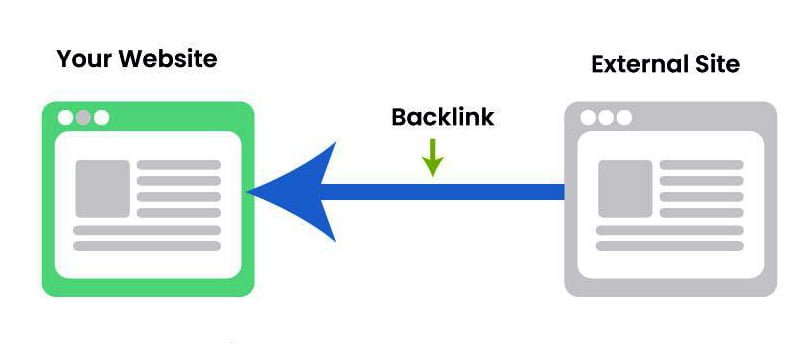The Importance of Backlinks for Your Website: Elevating Your Online Presence (2024)
an article on the Importance of Backlinks for Your Website

Table of Contents
Introduction to Backlinks
Backlinks, often referred to as inbound or incoming links, are hyperlinks that direct users from one website to another. In the context of website optimization, they play a pivotal role in determining a site’s authority and credibility in the eyes of search engines, such as Google. Essentially, when a webpage links to another, it is a vote of confidence, indicating that the linked content is valuable and relevant. This mechanism is crucial for the algorithms that search engines employ, as they assess the quality and quantity of backlinks to rank websites in search results.
Understanding how backlinks function is essential for anyone looking to enhance their online presence. When a website receives a backlink from a reputable source, it signals to search engines that the content is trustworthy and worth viewing. Consequently, having a strong backlink profile can significantly improve a website’s position in search engine results pages (SERPs). Conversely, a lack of quality backlinks can hinder visibility, making it difficult for potential visitors to discover a site amid the vast array of online content.
Moreover, backlinks contribute to a website’s ability to attract organic traffic. They serve as pathways for users navigating the internet, guiding them from one webpage to another, thereby increasing the chances of engagement and interaction with the content. In the realm of WordPress, where users often rely on different strategies to enhance visibility, understanding and leveraging the power of backlinks should be a priority for website developers and content creators alike. By cultivating a diverse network of quality backlinks, sites not only elevate their online standing but also foster a more engaged audience.

How Backlinks Affect SEO
Backlinks play a crucial role in search engine optimization (SEO) by serving as a primary factor that search engines consider when determining the relevance and authority of a website. Essentially, backlinks act as votes of confidence from one site to another, signaling to search engines that the linked content is valuable and worth referencing. When a reputable site links to your content, it increases the credibility of your website, thus positively influencing your search engine rankings.
One key aspect of backlinks is the significance of anchor text, which is the clickable text in a hyperlink. The choice of anchor text is important since it provides context about the linked page’s content. Effective anchor text not only helps search engines comprehend what your webpage is about but also improves user experience by guiding visitors to related content. For instance, if a popular blog links to your site with the anchor text “SEO tips,” it indicates to search engines that your page is relevant to that topic, which can enhance your visibility in search results.
Moreover, the quantity and quality of backlinks directly impact a website’s organic traffic. Websites with a robust backlink profile tend to rank higher in search engine results pages (SERPs), making them more likely to be discovered by users. High-quality backlinks come from authoritative sites within your niche, which amplifies the trustworthiness of your own site. Conversely, low-quality backlinks may harm your SEO efforts, as search engines may interpret them as a sign of poor content or manipulation. Therefore, maintaining a strategic approach to acquiring quality backlinks is essential for optimizing your website built on WordPress or any other platform.
Types of Backlinks
Backlinks are essential components of any successful SEO strategy, and understanding the different types can significantly influence the performance of a website. The main types of backlinks include internal, external, dofollow, and nofollow links, each possessing unique characteristics and impacting SEO in various ways.
Internal backlinks are links that navigate users between different pages within the same website. They help in establishing a site’s architecture and improving user experience, allowing visitors to discover content more easily. From an SEO perspective, internal backlinks also aid search engines in understanding the site’s structure and hierarchy, which can enhance its indexing and overall performance in search rankings when managed effectively through platforms like WordPress.
External backlinks, on the other hand, link out to other websites from your own. They are crucial for building credibility and authority, as they signal to search engines that your content is valuable and trustworthy. A well-placed external backlink can drive referral traffic, while also contributing positively to the website’s SEO. The quality and relevance of the external sites linking back to your content can significantly affect how search engines perceive your authority in your niche.
Dofollow and nofollow are two types of links that further differentiate the influence of backlinks. Dofollow links allow search engines to follow them and pass on “link juice,” which can improve the linked page’s authority and rank. In contrast, nofollow links contain an attribute that instructs search engines not to follow them, thus not passing on link equity. While nofollow links may not contribute directly to SEO ranking, they can generate traffic and diversify a backlink profile. A well-balanced strategy that incorporates these different types of backlinks will ultimately support a website’s visibility and ranking on search engines.
The Value of Quality Over Quantity
In the realm of search engine optimization (SEO), the significance of backlinks cannot be overstated. However, it is essential to recognize that not all backlinks are created equal. The focus should be squarely on securing quality backlinks instead of merely aiming for a high quantity. Quality backlinks play a pivotal role in enhancing a website’s authority and credibility, which are crucial factors that search engines consider when ranking websites.
A primary attribute of a quality backlink is the authority of the linking site. Backlinks garnered from well-established, reputable websites carry far more weight than those from lesser-known sources. This is primarily due to the concept of trust; a backlink from a high-authority website signals to search engines that your site is also trustworthy. Therefore, when creating backlinks through platforms such as WordPress or other content management systems, prioritizing sites with recognized authority should be at the forefront of your backlink strategy.
Moreover, the relevance of the linking site to your own content is another critical factor. A backlink from a site that shares a similar niche or industry can drive meaningful referral traffic, leading to higher engagement and potentially increased conversion rates. For instance, if your website focuses on digital marketing, a backlink from a respected marketing blog will be far more beneficial than one from a completely unrelated site. This relevance aids search engines in understanding the context of your content, further boosting your SEO efforts.
In conclusion, focusing on acquiring quality backlinks from authoritative and relevant websites is far more advantageous than accumulating a large number of low-quality links. By emphasizing these elements when building a backlink profile, website owners can establish a solid foundation for improved online presence and search engine visibility.
Strategies for Building Backlinks
Building backlinks is a fundamental strategy to enhance your website’s authority and visibility in search engine results. There are several effective methods to acquire high-quality backlinks that can significantly improve your online presence.
One of the most popular strategies for obtaining backlinks is through guest blogging. This involves writing informative and engaging articles for other reputable websites in your industry. By providing valuable content, you can include a link back to your own site, fostering a mutually beneficial relationship with the host blog. This approach not only helps in attracting backlinks but also exposes your brand to a new audience.
Another effective method is to create shareable content. High-quality, unique content that resonates with your audience increases the likelihood of other sites linking back to you. This includes in-depth articles, infographics, videos, or research studies that offer value. By focusing on quality and relevance, you encourage others to share your content, thus generating organic backlinks.
Engaging in partnerships with influencers within your industry is also a strategic way to gain impactful backlinks. Influencers typically have a large following and credibility, which can help amplify your content’s reach. Collaborating on projects or campaigns can lead to endorsements and backlinks from their websites and social media profiles, driving significant traffic to your own site.
Lastly, utilizing social media effectively can facilitate additional backlink opportunities. By sharing your content on platforms where your audience engages, you increase the chances of others discovering and linking back to your articles. Building a strong social media presence allows for networking and interaction, often leading to valuable backlink acquisitions.
Altogether, employing these strategies can enhance your website’s link-building efforts, fostering improved SEO performance and elevating your overall online presence.
Measuring the Impact of Backlinks
Understanding the effectiveness of backlinks is crucial for evaluating their influence on your website’s performance. The success of a backlink strategy can be assessed through various metrics and tools, each offering insights into how well these links affect your website’s authority and visibility. A primary metric to consider is Domain Authority (DA), which predicts how well a website will rank on search engines. This score ranges from 1 to 100, indicating the likelihood of a site ranking higher based on its backlinks and overall quality. Monitoring your site’s DA over time can signal the impact of your backlinking efforts.
Another essential metric is Page Authority (PA), which focuses on the potential performance of individual pages rather than the entire domain. PA is particularly relevant in evaluating the effectiveness of specific backlinks on key pages of your website. Alongside these indicators, analyzing referral traffic—visitors arriving at your site from external links—is critical. By examining this data in analytics tools, you can gauge the actual audience engagement derived from your backlink sources.
The correlation between backlinks and search rankings further illustrates their importance. Generally, higher authority backlinks will elevate your site’s ranking, while low-quality links may impede it. Thus, employing tools such as Moz, Ahrefs, or SEMrush can provide valuable insights into the quality and number of backlinks pointing to your site. These analytics tools evaluate factors like anchor text diversity and link growth over time, allowing for a comprehensive understanding of your backlink profile.
Ongoing analysis is essential to ensuring that your backlink strategy adapts to changes in search engine algorithms and market trends. Regular monitoring allows for the identification of toxic links that may harm your site’s credibility. By continually analyzing these metrics, you can enhance your overall SEO strategy and consequently your site’s online presence, leveraging the true power of backlinks.
Common Mistakes to Avoid
Building a robust backlink profile is crucial for enhancing a website’s authority and visibility. However, several common pitfalls can undermine these efforts. One significant mistake is relying on spammy link-building tactics. These methods often involve purchasing links from dubious sources or participating in link farms, which can have detrimental effects on your website’s credibility. Such practices may lead to penalties from search engines and ultimately jeopardize your online presence.
Another prevalent error is neglecting the relevance of the backlinks you pursue. Quality is far more important than quantity when it comes to creating a successful backlinking strategy. Securing links from websites that are not relevant to your niche can dilute your site’s authority and may not contribute positively to your rankings. It is essential to target reputable sites that share similar themes or content, as this establishes a trustworthy relationship and enhances organic search results.
Moreover, engaging in black-hat SEO techniques, such as cloaking or keyword stuffing, can have lasting negative effects on both your site’s performance and its reputation. These unethical tactics might provide short-term gains but are likely to result in long-term repercussions, including deindexing by search engines. Instead, focus on white-hat practices, such as producing valuable content and fostering genuine relationships with other websites for backlink opportunities.
In addition, it is important to continually monitor your backlink profile. Regular audits will help identify low-quality or toxic backlinks that could harm your site’s standing. Utilizing tools and services for backlink analysis is advisable to ensure your strategy remains clean and effective. By avoiding these common mistakes and prioritizing ethical and relevant backlink practices, you can significantly elevate your website’s online visibility and authority.
The Future of Backlinking
The landscape of search engine optimization (SEO) is continually evolving, and backlinks remain an integral part of this dynamic environment. As search engines refine their algorithms, they increasingly prioritize the quality and relevance of backlinks. Future trends suggest that backlinks will not only serve as a ranking factor but also as a critical element influencing user experience and content quality. With ongoing updates to algorithms, it will be crucial for website owners to keep their backlink strategies aligned with these changes.
One notable trend is the increasing emphasis on the user experience. Search engines are becoming more adept at assessing how users interact with content, and this includes evaluating the quality of links that point to a website. Therefore, securing backlinks from sites that prioritize user engagement can have a more significant impact on a website’s authority. This shift underscores the need for website owners to focus on obtaining high-quality links that not only drive traffic but also enhance user satisfaction.
Moreover, content marketing is undergoing a transformation that is likely to affect backlinking strategies. As content becomes more diverse—incorporating formats like videos, podcasts, and interactive infographics—the opportunities for acquiring backlinks will expand. Marketers who create engaging content will find it easier to cultivate organic backlinks from various platforms, ultimately boosting their visibility within the digital ecosystem. As we move forward, embracing innovative content formats while forging relationships with relevant online communities will be vital to backlink success.
In summary, understanding the future of backlinks involves recognizing the critical need for quality, user experience, and adaptable content marketing strategies. By anticipating these trends, website owners can effectively position their websites for sustained growth and increased authority in an ever-changing online landscape.
Conclusion
In summary, the pivotal role of backlinks in elevating your website’s online presence cannot be overstated. Backlinks serve as vital indicators of a website’s authority, trustworthiness, and relevance in search engine rankings. When a website earns quality backlinks, it signals to search engines like Google that the content is valuable and worth sharing. This, in turn, can lead to improved visibility and higher organic traffic, which are essential components of a robust SEO strategy.
The discussion underscores the necessity for website owners to cultivate a diverse range of backlinks from reputable sources. Strategic methods such as guest posting, collaborating with influencers, and creating shareable content are effective in this endeavor. Furthermore, maintaining a well-structured website built on platforms like WordPress allows for easier optimization of backlinks, reinforcing your site’s credibility and enhancing user experience. By actively pursuing backlinking strategies, you not only improve your search engine ranking but also engage more effectively with your target audience.
Investing time and effort into your backlinking strategy is crucial for sustaining long-term growth. As digital marketing continues to evolve, the influence of backlinks remains a steadfast element in online success. Implementing best practices and monitoring your backlink profile can lead to significant improvements over time. Therefore, it is imperative to remain proactive in your approach to building a strong network of backlinks as part of your overall SEO plan. By doing so, you will significantly enhance your website’s performance and ensure its ongoing relevance in an increasingly competitive digital landscape.
FAQ
Question
Answer
Question
Answer
For more information about SEO click here
To visit the website of wesila click here





